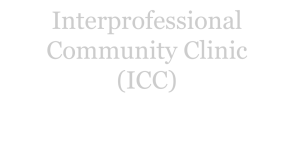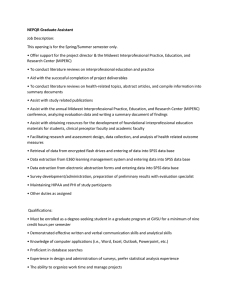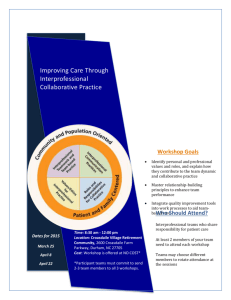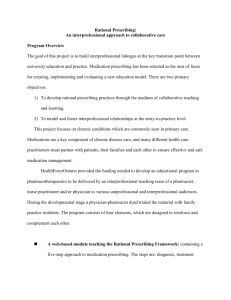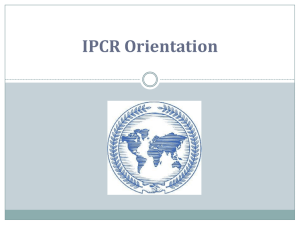ABSTRACT: 2016 ELAM Institutional Action Project Symposium
advertisement
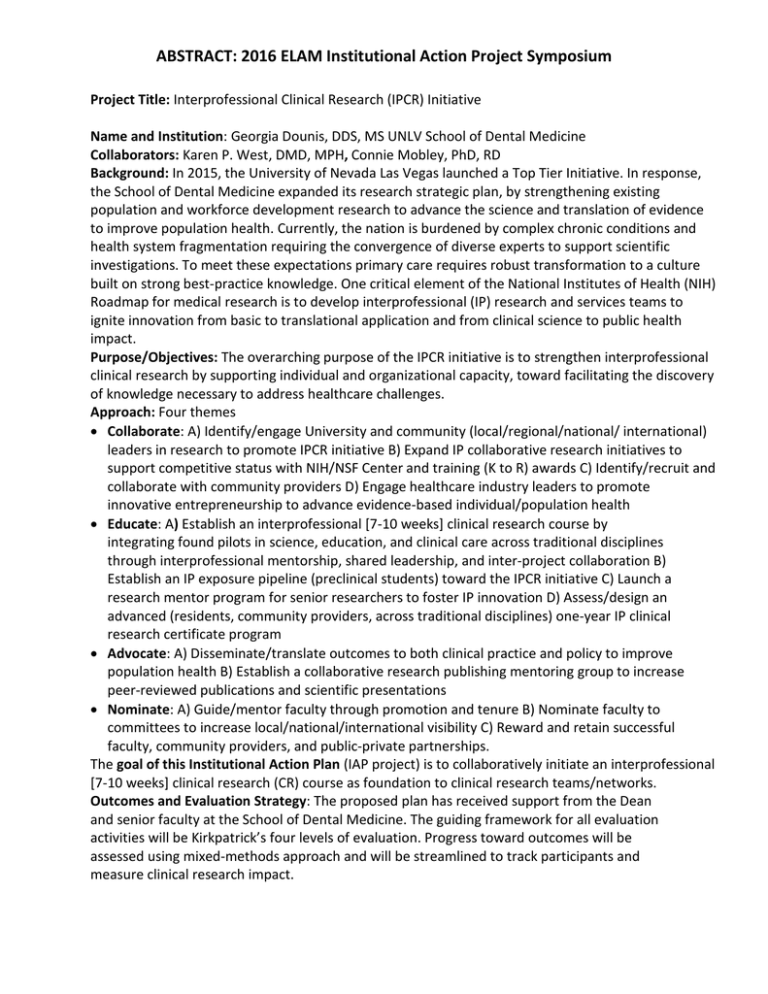
ABSTRACT: 2016 ELAM Institutional Action Project Symposium Project Title: Interprofessional Clinical Research (IPCR) Initiative Name and Institution: Georgia Dounis, DDS, MS UNLV School of Dental Medicine Collaborators: Karen P. West, DMD, MPH, Connie Mobley, PhD, RD Background: In 2015, the University of Nevada Las Vegas launched a Top Tier Initiative. In response, the School of Dental Medicine expanded its research strategic plan, by strengthening existing population and workforce development research to advance the science and translation of evidence to improve population health. Currently, the nation is burdened by complex chronic conditions and health system fragmentation requiring the convergence of diverse experts to support scientific investigations. To meet these expectations primary care requires robust transformation to a culture built on strong best-practice knowledge. One critical element of the National Institutes of Health (NIH) Roadmap for medical research is to develop interprofessional (IP) research and services teams to ignite innovation from basic to translational application and from clinical science to public health impact. Purpose/Objectives: The overarching purpose of the IPCR initiative is to strengthen interprofessional clinical research by supporting individual and organizational capacity, toward facilitating the discovery of knowledge necessary to address healthcare challenges. Approach: Four themes • Collaborate: A) Identify/engage University and community (local/regional/national/ international) leaders in research to promote IPCR initiative B) Expand IP collaborative research initiatives to support competitive status with NIH/NSF Center and training (K to R) awards C) Identify/recruit and collaborate with community providers D) Engage healthcare industry leaders to promote innovative entrepreneurship to advance evidence-based individual/population health • Educate: A) Establish an interprofessional [7-10 weeks] clinical research course by integrating found pilots in science, education, and clinical care across traditional disciplines through interprofessional mentorship, shared leadership, and inter-project collaboration B) Establish an IP exposure pipeline (preclinical students) toward the IPCR initiative C) Launch a research mentor program for senior researchers to foster IP innovation D) Assess/design an advanced (residents, community providers, across traditional disciplines) one-year IP clinical research certificate program • Advocate: A) Disseminate/translate outcomes to both clinical practice and policy to improve population health B) Establish a collaborative research publishing mentoring group to increase peer-reviewed publications and scientific presentations • Nominate: A) Guide/mentor faculty through promotion and tenure B) Nominate faculty to committees to increase local/national/international visibility C) Reward and retain successful faculty, community providers, and public-private partnerships. The goal of this Institutional Action Plan (IAP project) is to collaboratively initiate an interprofessional [7-10 weeks] clinical research (CR) course as foundation to clinical research teams/networks. Outcomes and Evaluation Strategy: The proposed plan has received support from the Dean and senior faculty at the School of Dental Medicine. The guiding framework for all evaluation activities will be Kirkpatrick’s four levels of evaluation. Progress toward outcomes will be assessed using mixed-methods approach and will be streamlined to track participants and measure clinical research impact. Interprofessional Clinical Research Initiative Georgia Dounis, DDS, MS University of Nevada Las Vegas School of Dental Medicine Collaborators: Karen P. West, DMD, MPH, Connie Mobley, RD, PhD Background, Challenge/Opportunity Methods/Approach In 2015, the University of Nevada Las Vegas (UNLV) launched a Top Tier Initiative. In response, the UNLV School of Dental Medicine expanded its research strategic plan, which calls for strengthening existing population and workforce development research to advance the science and translation of evidence to improve population health. Currently, the nation is burdened by complex chronic conditions and health system fragmentation requiring the convergence of diverse experts to support scientific investigations. To meet these expectations primary care requires robust transformation of culture built on strong best practice knowledge. One critical element of the National Institutes of Health (NIH) roadmap for medical research is to develop interprofessional (IP) research and services teams to ignite innovation from basic to translational application and from clinical science to public health impact. Discussed plan with senior faculty at the SDM-approved Plan discussed with Dean at the SDM-approved IAP presented to ELAM consultants IAP presented and discussed with Dean at the School of Medicineendorsed Curriculum planning with Vice Dean of Research School of Medicine Outcomes: Outcomes Strategies •Student evaluation survey data •Increase the number (90%) of students that successfully complete the CR course •Increase (50/80/100%) student participation in IP research studies •Increase (50/80/100%) number of student presentations at local, national, international venues •Increase number (50/80/100%) of publications at peer review journals •Increase (25%) research application submission 1) Identify a IPCR curriculum committee (Dentistry/Medicine) explore common themes, found pilots, shared goals to develop IPCR curriculum 2) Develop clinical research interest survey to gage interprofessional preclinical students’ knowledge, attitudes, perceptions and identify research topics of interest 3) Collaborate/develop course objectives/design 4) Load new curriculum /IP studies on Eplatform Presented at the 2016 ELAM® Leaders Forum 10/2015 11/2015 01/2016 03/2016 Evaluation/Outcomes Strategies/Discussion/Summary Proposed Activities and Timeline Phase 2 (2017-2019) Collaboratively [2 disciplines then Launch a research mentor program expand] design an IP preclinical CR designed for IP senior researchers to [7-10weeks] course foster innovation Interprofessional Clinical Research (IPCR) initiative is to strengthen interprofessional clinical research by supporting individual and organizational capacity, toward facilitating the discovery of knowledge necessary to address healthcare challenges. Milestones 04/2016 Phase 1 (2016-2018) Purpose/Objectives: The overarching purpose of the Timeline Phase 3 (2019-2021) Develop an advanced one-year IP clinical research certificate program 1) Identify/engage University and community (local/regional/national/ international) leaders in research to promote IPCR initiative 1) Develop clinical research interest survey to gage residents/fellows/junior faculty/ community providers knowledge, attitudes, perceptions and identify research topics of interest 2) Develop clinical research interest survey to 2) Identify/engage University and community gage senior researchers knowledge, attitudes and (local/regional/national/ international) collaborators to perceptions of clinical research mentoring promote IPCR initiative. 3) Collaboratively develop curriculum to address mentoring topics/strategies 4) Load new mentoring curriculum on the Eplatform 3) Develop new didactic/IP joint research studies curriculum load E-platform 4) Pilot [2 disciplines then expand] the advanced oneyear interprofessional clinical research certificate program, cultivate team-building, team-learning, evaluate/ disseminate/revise 5) Pilot the course, cultivate team-building, 5) Pilot the course, cultivate team-building, team- 5)Develop areas of research with interprofessional team-learning evaluate/disseminate/revise teaching, evaluate/ disseminate/ revise investigators to ensure competitive status (K to R) awards with NSF/NIH Center and training awards Develop tools to evaluate sustainability of initiative; review/ disseminate/translate outcomes to practice, policy and public health impact (2016-18) Engage community via economic development (technology transfer and research partnership) to promote innovative entrepreneurship in advancing evidence-based practice to improve population health (2017-21) Advocate and Nominate (2016-2021) The goal of this Institutional Action Plan (IAP project) is to collaboratively initiate an interprofessional [7-10 weeks] clinical research (CR) course as foundation to develop clinical research teams/networks. The proposed plan has received support from the Dean ($200,000/5yr) and senior faculty at the School of Dental Medicine and has been endorsed by the Dean of the School of Medicine. The guiding framework for all evaluation activities will be Kirkpatrick’s four levels of evaluation. Key outcomes have been identified at each of these levels; progress toward the outcomes will be assessed using mixed-methods approach. Mixed methods will be streamlined to track participants (completers/graduates) to measure clinical research impact. Discussion and Impact This IAP project will advance the process of scientific inquiry in the development and dissemination of new knowledge as an integral part of the mission, goals and objectives of the UNLV School of Dental Medicine and UNLV School of Medicine. It will support the Top Tier Initiative of the UNLV as well as support the Commission on Dental Accreditation (CODA), and the Accreditation Council for Graduate Medical Education (ACGME) accreditation standards. Furthermore, this collaborative clinical research initiative will enable the transformation of healthcare delivery systems to improve quality and population health. Summary/Conclusion Next steps •Completion an IPCR business plan •Explore/apply for federal funding to support IPCR initiative •Refine long-term goals, implementation, and assessment plan •Assess/develop an IPCR Master’s degree/PhD programs
